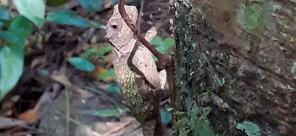Birds of Vietnam, Bird Species in Vietnam

Let's join AdventureGreen on our bird quests to learn about the different birds and bird species in Vietnam. Here you can find out more about the birding spots that these bird species are found.
- Order: Passeriformes
- Family: Zosteropidae
- Genus: Zosterops
Chestnut-flanked white-eye
(Vành khuyên sườn hung, Zosterops erythropleurus)
The chestnut-flanked white-eye (Zosterops erythropleurus) is a bird in the family Zosteropidae.
The name Zosterops combines the Ancient Greek words zosteros "belt" or "girdle" and opos "eye".
erythropleurus from Greek: erythro-: red; pleura: rib, side.
- Order: Passeriformes
- Family: Zosteropidae
Zosterops (meaning "eye-girdle") is a genus of passerine birds containing the typical white-eyes in the white-eye family Zosteropidae.
The name combines the Ancient Greek words zosteros "belt" or "girdle" and opos "eye".
1/ Indian white-eye (Vành khuyên họng vàng, Zosterops palpebrosus), formerly the Oriental white-eye
palpebrosus being Neo-Latin for "having prominent eyelids", from the Latin palpebrae "eyelids": palpebra meaning "eyelid" and osus meaning "full of".
2/ Chestnut-flanked white-eye (Vành khuyên sườn hung, Zosterops erythropleurus)
erythropleurus from Greek: erythro-: red; pleura: rib, side.
3/ Warbling white-eye (Vành Nhật Bản, Zosterops japonicus), also known as the Japanese white-eye and mountain white-eye
4/ Swinhoe's white-eye (Zosterops simplex)
- Order: Passeriformes
- Family: Oriolidae
Orioles are colourful Old World passerine birds in the genus Oriolus, the type genus of the corvoidean family Oriolidae.
"Oriole" derives from the Latin word aureolus meaning "golden".
1/ Maroon oriole (Tử anh, Oriolus traillii)
2/ Black-hooded oriole (Vàng anh đầu đen, Oriolus xanthornus)
The specific epithet xanthornus is from the Ancient Greek xanthos "yellow" and ornis "bird".
3/ Black-naped oriole (Vàng anh gáy đen, Oriolus chinensis)
4/ Slender-billed oriole (Oriolus tenuirostris)
Vàng anh mỏ nhỏ
5/ Silver oriole (Oriolus mellianus)
- Order: Passeriformes
The Old World orioles (Oriolidae) are an Old World family of passerine birds.
"Oriole" derives from the Latin word aureolus meaning "golden".
The family Oriolidae comprises the piopios, figbirds, pitohuis and the Old World orioles.
- Order: Passeriformes
- Family: Sittidae
The genus Sitta comprise the nuthatches which are small passerine birds belonging to the family Sittidae.
1/ Indian nuthatch (Trèo cây bụng hung, Sitta castanea)
From Ancient Greek kastáneia, from kástana meaning chestnut or chestnut tree.
This species has been split by Rasmussen and Anderton (2005) from the chestnut-bellied nuthatch.
2/ Chestnut-vented nuthatch (Trèo cây đít hung, Sitta nagaensis)
The species name is composed of naga and the Latin suffix -ensis, "that lives in, that inhabits," was given in reference to the area when the type of the species was collected, the Naga Hills.
3/ White-tailed nuthatch (Trèo cây Himalaya, Sitta himalayensis)
4/ Beautiful nuthatch (Trèo cây lưng đen, Sitta formosa)
The name derives from the Latin name Formosus and Spanish word "fermoso", meaning "beautiful".
5/ Yellow-billed nuthatch (Trèo cây mỏ vàng, Sitta solangiae)
6/ Velvet-fronted nuthatch (Trèo cây trán đen, Sitta frontalis)
Latin word meaning "frontal" (= relating to the forehead).
7/ Burmese nuthatch (Sitta neglecta), also known as the neglected nuthatch
- Order: Passeriformes
The nuthatches constitute a genus, Sitta, of small passerine birds belonging to the family Sittidae.
The nuthatches are all in the genus Sitta, a name derived from sitte, Ancient Greek for this bird.
The English term nuthatch refers to the propensity of some species to wedge a large insect or seed in a crack and hack at it with their strong bills.
- Order: Passeriformes
- Family: Alaudidae
Plocealauda is a genus of larks in the family Alaudidae.
Introduced in 2023, the genus contains five species that were formerly placed in the genus Mirafra.
Their distributions range from the Indian subcontinent to Southeast Asia.
The genus Plocealauda contains five species, all of which include "bush lark" in their English name.
1/ Indochinese bush lark (Sơn ca Đông Dương, Plocealauda erythrocephala) or Indochinese lark
The prefix erythr- or erythro- means red or reddish. It is derived from the Greek word eruthros meaning red.
cephalo- or cephal-N ew Latin, from Greek kephalo-, from kephalē, head
2/ Bengal bush lark (Sơn ca Thái lan, Plocealauda assamica) or Bengal lark, rufous-winged lark
Alaudidae is from Alauda for lark in Latin.
The genus name Plocealauda is a portmanteau of the genera Ploceus and Alauda:
- The word Ploceus comes from the New Latin word plokeus, which is derived from the Ancient Greek word plekein (πλεκειν), meaning "to plait," "to weave," or "to braid". The Greek word plokeus (πλοκευς) itself means "weaver" or "plaiter".
- The term Alauda is Latin for "lark" or "skylark". It comes from Gaulish, a Celtic language, and is the genus name for skylarks.
- Order: Passeriformes
- Family: Alaudidae
- Genus: Plocealauda
Indochinese bush lark
(Sơn ca Đông Dương, Plocealauda erythrocephala) or Indochinese lark
The Indochinese bush lark (Plocealauda erythrocephala) or Indochinese lark is a species of lark in the family Alaudidae found in southeast Asia.
Alaudidae is from Alauda for lark in Latin.
The genus name Plocealauda is a portmanteau of the genera Ploceus and Alauda:
- The word Ploceus comes from the New Latin word plokeus, which is derived from the Ancient Greek word plekein (πλεκειν), meaning "to plait," "to weave," or "to braid". The Greek word plokeus (πλοκευς) itself means "weaver" or "plaiter".
- The term Alauda is Latin for "lark" or "skylark". It comes from Gaulish, a Celtic language, and is the genus name for skylarks.
The scientific epithet erythrocephala:
The prefix erythr- or erythro- means red or reddish. It is derived from the Greek word eruthros meaning red.
cephalo- or cephal-N ew Latin, from Greek kephalo-, from kephalē, head.
- Order: Passeriformes
- Family: Alaudidae
- Genus: Mirafra
Singing bush lark or Horsfield's bush lark (Sơn ca Java, Mirafra javanica)
The singing bush lark or Horsfield's bush lark (Mirafra javanica) is a species of lark which inhabits grassland throughout most of Australia and much of Southeast Asia.
Alaudidae is from Alauda for lark in Latin.
The exact etymological origin of "Mirafra" is unknown, but the Latin root "mirus" (meaning "wonderful" or "wondrous") is a possibility, as the name is given to a genus of larks, birds known for their song.
- Order: Passeriformes
- Family: Alaudidae
- Genus: Plocealauda
Bengal bush lark
(Sơn ca Thái lan, Plocealauda assamica) or Bengal lark, rufous-winged lark
Formerly belonged to the genus mirafra
The Bengal bush lark (Plocealauda assamica) or Bengal lark is a species of lark in the family Alaudidae found in southern Asia.
Traits:
- Breast spotted with dark, gray or black colors;
- Rufous red on the outer wing feathers.
Alaudidae is from Alauda for lark in Latin.
The genus name Plocealauda is a portmanteau of the genera Ploceus and Alauda:
- The word Ploceus comes from the New Latin word plokeus, which is derived from the Ancient Greek word plekein (πλεκειν), meaning "to plait," "to weave," or "to braid". The Greek word plokeus (πλοκευς) itself means "weaver" or "plaiter".
- The term Alauda is Latin for "lark" or "skylark". It comes from Gaulish, a Celtic language, and is the genus name for skylarks.
"Assamica" is a Latin term to indicate a possible origin from the Assam region of India.
- Order: Passeriformes
- Family: Alaudidae
Mirafra is a genus of lark in the family Alaudidae. Some Mirafra species are called "larks", while others are called "bush larks".
They are found in Africa except for the singing bush lark that is found through South Asia to Australia.
1/ Singing bush lark or Horsfield's bush lark (Sơn ca Java, Mirafra javanica)
Alaudidae is from Alauda for lark in Latin.
The exact etymological origin of "Mirafra" is unknown, but the Latin root "mirus" (meaning "wonderful" or "wondrous") is a possibility, as the name is given to a genus of larks, birds known for their song.
- Order: Passeriformes
- Family: Alaudidae
- Genus: Alauda
Oriental skylark (Alauda gulgula), also known as the small skylark,
eastern skylark, Indian skylark and lesser skylark.
The Oriental skylark (Alauda gulgula), also known as the small skylark, is a species of skylark found in the Sino-Indian region and parts of central Asia.
The current genus name Alauda is from Latin alauda, "lark".
The meaning of the specific epithet gulgula is uncertain but is perhaps a reference to the song as gula is Latin for "throat" or may be the color of the "gulgula" or a sweet.





































